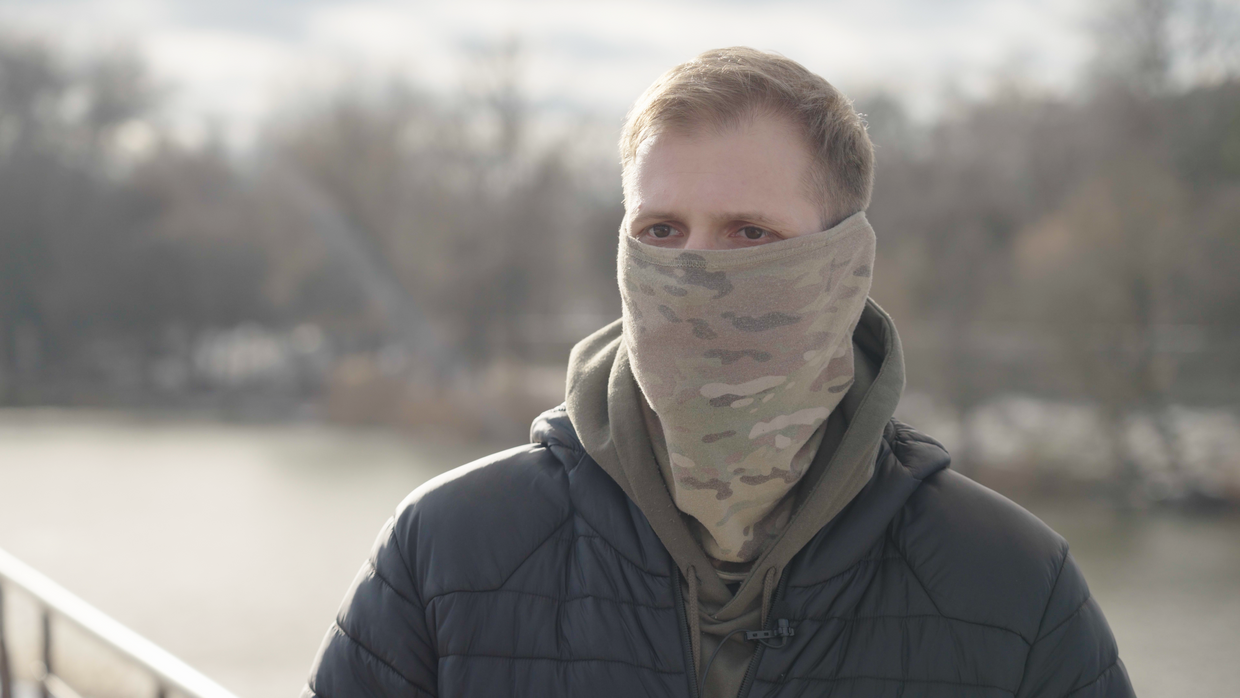'Everything we heard from Russians was a lie' — Chinese fighters captured by Ukraine speak out

Chinese nationals Zhang Renbo (L) and Wang Guangjun, who participated in Russia's full-scale war against Ukraine and were taken prisoner on the battlefield, answer journalists' questions in Kyiv, Ukraine, on April 14, 2025. (Olena Zashko/The Kyiv Independent)
The two Chinese nationals captured when fighting for Russia claimed they weren’t sent to the war by the Chinese government, and described their hardships in the Russian ranks.
One of the captives, Wang Guangjun, said he was targeted by Russian "chemical weapons" right after he was taken captive by a Ukrainian soldier, he told reporters at a press conference in Kyiv on April 14.
"I was losing my strength and fainting... Then I felt someone grabbing my collar and pulling me out into the fresh air," Wang said.
According to Wang, after he was captured by Ukrainian troops, he found himself in a dugout with a Ukrainian soldier, taking shelter during a Russian attack. He said that the Ukrainian helped him to survive what Wang described as a "spray gas" attack.
"(Ukrainian) soldiers protected us and have been treating us well this whole time," he added.
Wang Guangjun and Zhang Renbo, born in 1991 and 1998, were the first Chinese nationals to be captured while fighting in the Russian army ranks against Ukraine, on Ukrainian soil. Their capture was announced by President Volodymyr Zelensky earlier in April. On April 11, Zelensky said that at least "several hundred" Chinese citizens are fighting on Russia's side in Ukraine.
Days later, the two were brought to a press conference.
The two spoke Chinese. Their answers were translated into Ukrainian by a government provided translator. The Kyiv Independent could not verify their claims or the accuracy of the translation.
Wang said he was in China, flipping through TikTok, when he saw an advertisement to join the Russian army. After losing his job last summer, he was interested in the offer, especially since, he said, military service is seen as "prestigious" in China.
A recruiter Wang contacted told him that a Chinese recruit could earn 200,000 to 250,000 Russian rubles ($2,000-$3,000) per month in the Russian army, which is higher than the average salary in China. The recruiter also promised to cover his travel to Russia and help him obtain the necessary documents, according to Wang.
But this failed to materialize, he said. Later, he said, Russians took away his bank card and phone, so that Wang couldn’t manage the money he was making.

The other captured soldier, Zhang, shared that he came from a wealthy family and worked as a firefighter and rescuer. He said he came to Russia in December, and first was offered a job in construction, but eventually was recruited for military service.
"I wanted to make money, but I did not expect to end up in the war."
None of the two soldiers mentioned where in China they were from.
The two claimed they had no connection to the Chinese government and that they signed a contract with the Russian army of their own free will.
Their routes passed through Moscow, Rostov-on-Don, and Russian-occupied Donetsk in eastern Ukraine before reaching the battlefield.
According to Wang, he also was placed in the camp in Kazan with people of other nationalities, presumably from Central Asia, Ghana, and Iraq.
Russia has enlisted foreign fighters from multiple countries, including India, Nepal, and Syria, to fight against Ukraine. Moscow has also used some 12,000 North Korean troops dispatched by Pyongyang to counter the Ukrainian incursion in Kursk Oblast.
The Chinese captives said they were subordinated to Russian commanders, who relied on gestures to give them orders.
Wang said that it would have been difficult to escape once he enlisted, because the control at the training ground was very tight.
Wang also claimed that he didn’t kill any Ukrainian soldiers. He claimed he had spent only three days at the front line when he was captured.
Zhang said he hadn’t seen any Ukrainian soldiers until the moment he was captured.
Both Chinese nationals criticized Russia at the press conference and discouraged their compatriots from going to war for it. It’s not possible to verify the sincerity of their claims, as they were in Ukrainian captivity when making the statements.

"For those (Chinese) citizens who want to take part in the war, we want to say that they should not do so," Wang said. "Since everything we heard from the Russians was a lie. It turned out that Russia is not that strong, and Ukraine is not that weak. That's why it's better not to participate in wars at all."
Although China portrays itself as a neutral party, its neutrality has been thrown into question many times, including when it became the Kremlin's largest supplier of dual-use goods essential for weapons manufacturing.
Asked if Beijing had known about their involvement in Russia’s war, the two said that the government warned that Chinese citizens should not travel to places of hostilities. According to Zhang, the Chinese who fight in any country may face punishment under Chinese law.
Despite this, both men reiterated that they wanted to return to China, not Russia, as part of the future prisoner exchange.
"I understand that there may be punishment, and I am ready for it. But I still want to return home and to my family," Zhang said.
"Real war is completely different from what we have seen in movies and on TV," said Wang. "I regret one thing — I want to apologize to my parents. And my only wish is to go back (to China) and follow all the instructions that will help me do that."












